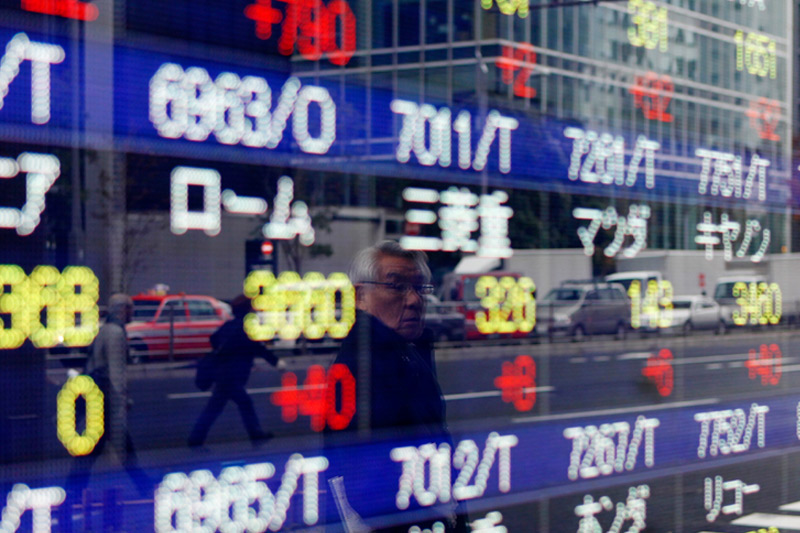Investing.com – Asian stocks markets were mixed on Wednesday as Chinese property developers and financial stocks gained after yesterday’s decision by the Peoples Bank of China to inject more liquidity.
The major gainers included China Vanke Co. that rose by 4.7% and Bank of China, which was up by 0.4%.
The Nikkei 225 fell 0.68% in morning trading, the Hang Seng index rose by 0.11% and the Shanghai Composite index rose 1.67%.
Meanwhile on Tuesday, U.S. stocks ended mixed to higher, pressured upward by a bullish take on the economy by the International Monetary Fund and lower by mixed quarterly corporate earnings.
At the close of U.S. trading on Tuesday, the Dow Jones Industrial Average fell 0.27%, the S&P 500 index rose 0.28%, while the Nasdaq Composite index rose 0.67%.
Telecommunications giant Verizon reported earnings and revenue that beat expectations though it announced plans to buy Intel's pay-television unit, which muted market applause.
Stocks saw downward pressure after the Travelers Companies and Johnson & Johnson released earnings that disappointed investors.
Elsewhere, the International Monetary Fund said it expects the global economy to grow by 3.7% in 2014, up from an October forecast of 3.6% growth, which bolstered stocks.
However, the news also fueled expectations for central banks to wind down stimulus programs such as bond purchases going forward, the Federal Reserve especially, as the multilateral lending institution predicted the U.S. economy to expand 2.8%, up from an October forecast of 2.6%.
Many market participants expect the Fed to trim its quantitative easing program to USD65 billion from the current USD75 billion at its next policy meeting on Jan. 29.
Fed bond purchases aim to prop up the economy by suppressing long-term interest rates, thus weakening the dollar as a side effect as investors flock to asset classes like stocks.
Talk of a tapering to bond purchases can send stocks lower by fanning uncertainty as to how equities will perform without a monetary crutch despite improvements taking place to economic fundamentals.
The major gainers included China Vanke Co. that rose by 4.7% and Bank of China, which was up by 0.4%.
The Nikkei 225 fell 0.68% in morning trading, the Hang Seng index rose by 0.11% and the Shanghai Composite index rose 1.67%.
Meanwhile on Tuesday, U.S. stocks ended mixed to higher, pressured upward by a bullish take on the economy by the International Monetary Fund and lower by mixed quarterly corporate earnings.
At the close of U.S. trading on Tuesday, the Dow Jones Industrial Average fell 0.27%, the S&P 500 index rose 0.28%, while the Nasdaq Composite index rose 0.67%.
Telecommunications giant Verizon reported earnings and revenue that beat expectations though it announced plans to buy Intel's pay-television unit, which muted market applause.
Stocks saw downward pressure after the Travelers Companies and Johnson & Johnson released earnings that disappointed investors.
Elsewhere, the International Monetary Fund said it expects the global economy to grow by 3.7% in 2014, up from an October forecast of 3.6% growth, which bolstered stocks.
However, the news also fueled expectations for central banks to wind down stimulus programs such as bond purchases going forward, the Federal Reserve especially, as the multilateral lending institution predicted the U.S. economy to expand 2.8%, up from an October forecast of 2.6%.
Many market participants expect the Fed to trim its quantitative easing program to USD65 billion from the current USD75 billion at its next policy meeting on Jan. 29.
Fed bond purchases aim to prop up the economy by suppressing long-term interest rates, thus weakening the dollar as a side effect as investors flock to asset classes like stocks.
Talk of a tapering to bond purchases can send stocks lower by fanning uncertainty as to how equities will perform without a monetary crutch despite improvements taking place to economic fundamentals.
